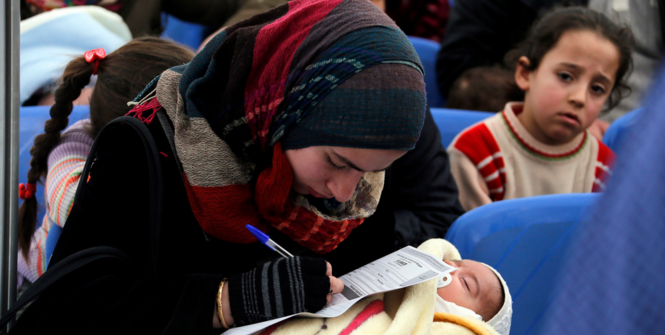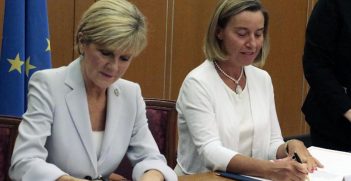Is the European Union Failing Syrian Refugees?

With the situation in Syria showing no signs of improvement, the influx of asylum seekers into Europe continues. However Europe is beginning to close its doors to the hundreds of thousands of Syrian refugees on its doorstep.
The refugee problem currently facing Europe is immense. In 2015, the United Nations High Commission for Refugees estimated that more than a million migrants crossed the Mediterranean. 84 percent of these came from the top 10 refugee-producing countries in the world. Another 74,000 have arrived in the first five weeks of this year. Alarmingly, the journey to Europe remains incredibly perilous. So far this year, at least 374 people have died. At this rate, last year’s 3,770 estimated deaths will likely be eclipsed.
These figures pale in comparison with the total population displaced by the Syrian civil war, a conflict which has created 5.3 million refugees and 6.6 million internally displaced persons. The vast majority of these remain in the countries around Syria: 2.5 million in Turkey, 1 million in Lebanon, and between 636,000 and 1.27 million in Jordan. These countries are at their tipping point. Moreover, Turkey has announced that it has reached its capacity to take new refugees and has closed its border to the 35,000 Syrians who have fled their government’s recent offensive.
After a long period of neglect, donors are making welcome contributions to the humanitarian crisis in Syria and its immediate neighbours. Recently, a commitment has been made to provide more than $US10 billion in assistance. Having said this, resettlement remains a critical and necessary part of the international response. However this is becoming increasingly difficult.
Germany and other European states made welcome commitments to host refugees following the death of Alan Kurdi (originally reported as Aylan Kurdi) in September, with Germany receiving 1.1 million asylum seekers last year. Yet, in the wake of the Paris bombings – committed by French and Belgian nationals, not refugees – and the New Year’s Eve attacks in Cologne, European governments have rapidly replaced these commitments with tighter border security and deterrence policies. These were designed to stop asylum seekers from making the claims they are entitled to under international law. In Denmark, new legislation allows the government to seize assets from asylum seekers to pay for the state’s costs, a provision that the United Nations High Commission for Refugees (UNHCR) has condemned as ‘an affront to their dignity and an arbitrary interference with their right to privacy’. Germany is considering new rules to take away benefits from asylum seekers if they refuse to try to learn German and integrate.
Even more concerning are moves to re-introduce border controls in violation of the Schengen Agreement, which allows for free movement within 26 of the EU states. These border controls are being used to restrict entry to asylum seekers and to drive them elsewhere within the EU. So far, six countries including Germany and Sweden have done so. Two weeks ago the Austrian interior minister, Johanna Mikl-Leitner, said ‘Schengen is on the brink of collapse‘. Hungary, which has built a fence along its border with Serbia and Croatia, has gone even further, calling for a border fence with fellow EU country Greece. Prime Minister Viktor Orban has stated ‘the best migrant is the migrant who does not come’.
Neither the European Union nor individual European countries have plans that would reduce the need for people to cross the Mediterranean. While the EU has introduced a scheme designed to resettle 120,000 refugees, this is for people who have already arrived in Europe. The EU has sought to make deals with Turkey, including one in November in which it promised to limit asylum seeker flows in exchange for 3 billion Euros and for a re-consideration of its EU membership bid. This agreement, however, did little to stop the refugee flow or to provide refugees with safe passage. Moreover, Turkey is not necessarily a safe country for refugees, particularly Syrian Kurds, as its security forces are engaged in a low intensity conflict with members of the outlawed Kurdistan Workers’ Party (PKK).
What is needed is a wider resettlement scheme, one that would take pressure off Syria’s neighbouring countries. Individual states have made pledges to resettle some 162,000 Syrian refugees. However, they have been slow to follow-up. In Australia, where former Prime Minister Tony Abbott committed to resettle 12,000 Syrians, only 26 Syrians have actually arrived, while only 200 have been granted visas. Australian Immigration Minister Peter Dutton has argued the delay is because ‘ultimately we want to make sure that we’re bringing the right people… People who can integrate into our community, that can get a job, can speak English, can give their kids the opportunity to go to school, that don’t treat women appallingly’.
Similarly, in the United States security concerns have been raised over admitting Syrian refugees, even though government officials note that it is ‘the most intensive vetting process of any group that arrives in the US’. In fact, the only country that is meeting its commitments is Canada, which has resettled 16,565 Syrian refugees since its resettlement plan was announced in November. It is on track to resettle a further 25,000 Syrians by the end of the month.
This failure to resettle Syrians can be improved on through a global and coordinated response by building safe processing centres in the region around Syria. UNHCR has noted that such centres could be established under international law if they clearly reflected international legal standards – including the right of refugees to not be returned to a country where they would face persecution – and if they have formal authorisation from host nations. Such regional processing centres would have two benefits: claim processing could be centrally coordinated through an organisation like UNHCR and refugees would be deterred from undertaking dangerous voyages, such as crossing the Mediterranean, in order to make their asylum claims. This crisis will not soon end, and it is only through global cooperation that we can ensure refugees receive protection.
Phil Orchard is a Senior Lecturer in International Relations and Peace and Conflict Studies at the University of Queensland as well as the Research Director of the Asia-Pacific Centre for the Responsibility to Protect. This article may be republished under a Creative Commons Licence.





